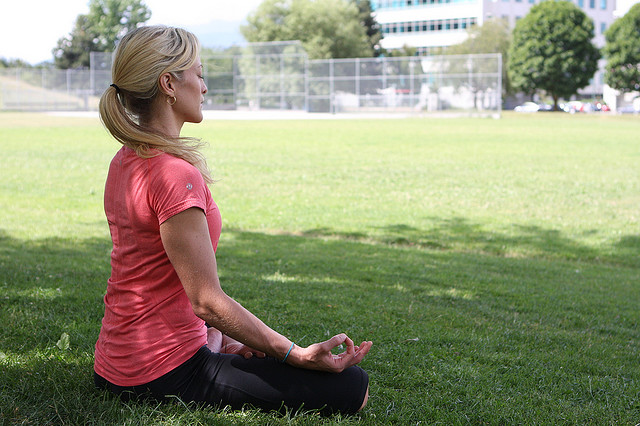
“Within you, there is a stillness and a sanctuary to which you can retreat at any time and be yourself.” ~Hermann Hesse
We’ve all had moments when life’s demands left us feeling stressed and scattered. In these moments, it’s helpful to have some simple tools to help us gain composure and come back to our center.
Let me paint a picture for you of a scene from my daily life at its most overwhelming.
On a recent Tuesday, I drafted my evening’s “to-do” list, which contained the following items: Go clothes shopping for my son, get groceries, cook up some dog food, cook dinner, give my son a bath, put laundry away, walk the dog, and prepare for a workshop that I was to present that weekend.
Like most working parents, I have to fit a lot of tasks into a brief period of time on weeknight evenings.
Clearly all of those items weren’t going to get accomplished. But I felt compelled to try.
And then, mid-afternoon, a feeling of illness began to creep over me, starting with a headache and progressing into nausea and profound fatigue. By the time I got home, I had revised my list, and whittled it down to: Bathe my son.
I felt incapable of anything else.
Still, even with a truncated list, my evening became chaotic very quickly. Our newly-acquired dog was dripping blood all over the house, including the white slipcover. She was not sick—she was in heat.
As I tried to attend to the mess, my son called to me from the kitchen. He held his cupped hand out to me, and proudly exclaimed, “I caught it so it wouldn’t fall on the kitchen floor!”
I will allow you to draw your own conclusions about what his hand held, but I’ll give you a hint: He’s potty training.
In the mean time, my head was throbbing, my stomach was retching, dishes from the previous day were piled up in the sink, laundry from the week sat haphazardly on my bedroom chair, and the workshop I was to present in four days had not been planned or prepared for. Not to mention, I had a hungry child and dog to attend to.
Sometimes, when external factors like these seem overwhelming, we feel unable to remove ourselves from the situation long enough to gain perspective and compose ourselves in order to move forward.
Very often, these external factors become internalized, and our minds start reeling. “I’ll never get it all done, my life is spiraling out of control, I can’t get myself together…” The internal loop can be loud, persistent, and ultimately paralyzing. And once it begins, it is hard to stop.
On this night, I felt so overwhelmed that I thought I would either cry or pass out. The only coping mechanism that came to mind was, “Sleep!” Given my sickness, this was probably quite appropriate. But I had things to do—real-life obligations that I could not avoid.
So what do you do in those moments when life must go on? What about the times you can’t defer your duties in favor of your bed?
I can tell you what I do.
For me, the key to feeling grounded is mind-body integration. And while a yoga class might be helpful toward this end, it’s hardly feasible in those everyday moments when life feels overwhelming.
I need simple, applicable strategies to help me feel centered.
Over years of working as a mental health professional and practicing these strategies for myself, I have found a handful of mind-body techniques that are really useful to employ when you’re having “one of those days.” Implement them during times of stress to help you find your center.
1. Three-Count Breath.
One way to help the body relax and restore its basic functioning is to steady your breath. Start in this way: Inhale for three counts. Hold for three counts. Exhale for three counts. After a few rounds of that, attempt to prolong the counts so that your breathing can slow and return to normal. This process can be helpful in less than a minute.
2. Stop Sign Visualization.
Those negative, looping thoughts that are spiraling out of control in your mind? They don’t serve you. There’s no time to listen to them, anyway: You have very important things to do!
So, to move forward without letting your thoughts drag you down, try this: For each self-defeating thought that pops up (“I’ll never get it all done!” and so on), visualize a large, red stop sign in your mind and think, “Stop.”
Try to drop the rest of the thought. This takes practice, because those thoughts have a lot of “psychic inertia” and that’s why they need a “Stop Sign.” Use it liberally.
3. Mantra/Affirmation.
Used alone or in conjunction with the Stop Sign Visualization, a simple mantra can be an effective tool.
Consider a few affirming phrases to repeat during these moments. It should be something that rings true to you and can reassure you. For example, “I can manage,” “This will pass,” “There is no emergency,” or “It will all get done.” Experiment with the right mantra for yourself, and repeat it often.
4. “5-5-5”
This technique is often recommended for people in dissociative episodes, but is useful and applicable during times of everyday stress as well. The purpose is to generate an awareness of your sensory experience so that you can feel more grounded in your body.
It’s very simple. Name the things you are experiencing for each of the senses: Identify five things you can see, five things you can feel, five things you can hear, and five things you can smell. For taste, a sip of cold water is often enough to bring awareness to the body.
5. Core Rooting.
Take a moment to stand with your feet a little wider than hip-width apart. Visualize your body as a tree, with your torso representing the trunk and your feet representing the roots. Focus your attention on your core and scan down your legs until you reach your feet.
Notice the ground beneath your feet. Feel the strength of your body. You are not “scattered” anymore; you are right here.
When you are able to center yourself in times of distress, you will find that you work more efficiently, relate to others more easily, and feel an improvement in your physical health. Each of the above techniques can be employed anywhere and any time, in just a minute or two.
Experiment with one or all and see what feels right for you.
Life can get hectic, but these simple tools can bring you back to center so that you can enjoy it.
Photo by Lululemon Athletica
About Angela Marchesani
Angela Marchesani is a psychotherapist and Holistic Health Coach practicing in Wayne, Pennslyvania. Visit her at angeladora.org.












 Though I run this site, it is not mine. It's ours. It's not about me. It's about us. Your stories and your wisdom are just as meaningful as mine.
Though I run this site, it is not mine. It's ours. It's not about me. It's about us. Your stories and your wisdom are just as meaningful as mine.
[…] like “they” always know just what I need to read at the right time. A recent post was about how to find your centre when life feels overwhelming, and it had some really useful strategies about how to stop you from feeling so scattered when life […]
[…] Angela Marchesani/TinyBuddha […]
Thanks for the tips Angela. I felt your pain while reading this as we all have those times of being overwhelmed (and more so when feeling ill), but it was also so funny – cue the dog and your son! But yes, you’re right – rarely are such times a ‘life or death’ situation, and therefore it’s good to have a coping strategy in place.
Andrea,
Strategy #6: Maintain your sense of humor and laugh at life’s absurdities! 🙂
Thanks for the feedback!
-Angela
Thank you, this is so helpful!
I am so glad! Thank you!
I really liked this thoughtful and practical advice. Thank you. I will try these 🙂
Great, thanks! I hope it’s useful!
Great article with wonderful suggestions. Breathing has always been my way of coming back to myself in any stressful situation. My mantra is usually “Breathe, let it go”. I have been telling my friends and family over many years to just breathe that it has almost become a joke, but one of endearment. I have many times sat with them, holding their hand, putting my hand on their back, or sometimes even each others hands on our chest while looking into each others eyes and help them breathe and slow down if it’s an extreme moment of stress.
I particularly like your idea of grounding by visualizing a tree. I have of course used it in yoga but I never thought about using it in times of needing to be grounded. Thank you for the great ideas.
Jacquellyn
Jacquellyn,
So glad you’ll be able to implement these ideas easily! Good point about the eye contact- if there’s a calm person available, sustained eye contact and a reassuring gesture can go a long way toward centering. Thanks for the feedback!
-Angela
thank you Angela, I’m just over from Michelle at Bleeding Espresso and in total overwhelm this morning (I totally get the potty reference) and just taking those 3 breaths helped straight away.
ciao for now
Lisa
Lisa,
As they say in Italy, “Prego!” 🙂 You’re very welcome, and I’m glad you got some instant relief.
-Angela
Beautiful post and very helpful for me at this time!! Thank you.
Nikki,
I’m glad you found it helpful! Thanks for reading!
-Angela
Thank you Angela. I can see this very being very helpful. I must share with some of my friends.
I’m glad you find it useful! Share away. 🙂
-Angela
Thanks for the article. It seems from the reading through the article, that the key is to increase mindfulness during this difficult time as well as to stay “grounded” in order to gain control of the situation. Words of affirmation works well for me. So is the slow breathing exercise.
Mulkurnia,
So true. And isn’t our tendency to want to “escape” unpleasant moments, out of fear or discomfort? But with some mindfulness and awareness, they become less scary and overwhelming.
Thanks for the feedback! Hope it’s helpful!
-Angela
This is very helpful information! Some days I feel
So overwhelmed I just want to curl
Up in a ball in the corner. Thx so much!!!
Dfhockey73,
In the moment I described in this post, I had the same inclination. But these are some really easy ways to get through it. Hope you find them useful!
-Angela
Hi Angela, thanks for the post. I especially like the Stop Sign analogy. In those moments where we’re tethering on the edge of overwhelm, we really do have to put on the mental breaks and stop ourselves before things get too bad.
For those interested, I recently wrote a similar article ago you might enjoy, it’s entitled “Next time you freak out, here’s what to do”: http://www.thefeelgoodlifestyle.com/the-next-time-you-freak-out-heres-what-to-do.html
Thanks, Phil! Your blog is great. That particular post mentions the idea of action or working toward a resolution as a helpful way of dissolving those feelings of being overwhelmed, and I wholeheartedly agree.
Thanks for sharing!
Thanks for the great suggestions! Awesome ideas…
I have a similiar technique for the “Stop Sign” which is to visual a little gremlin (like the Just For Laughs one) that is annoyingly telling me these things and then giving a boot away. Feels amazing and gives me a sense of power over my own thoughts.
Shane,
I’m glad you enjoyed it. Sounds like your gremlin technique is helpful! Thanks for sharing!
-Angela
I believed inside all of us theres a quite,serene place.And I tried to connect with it every time i lost balance.With time I forgot that practice.Thanks for reminding:)
Thank you! Breathing really does help.
I was in bed ready for sleep at 4:30 pm when I found this. Overwhelmed by what needs to be done.and was ready to start tearing up. This article was very helpful. And made me laugh.
Thank You
-.-
Thank you so much. Great article. There is something here more satisfying than the worlds alone. THe fact another person cares enough to take the time to write these tips for no gain for themselves is reassuring. Thank you. Mickey, UK
I just started college and have been getting such bad anxiety and depersonalization, which few people even know exists. This has helped me endlessly, thank you so much.
I’ve had a few years of therapy and was never taught 5-5-5-5-5! For some reason, my shrinks believed that breathing would ground me. It never stopped the dissociation. Sometimes it caused me to panic and hyperventilate. Another idiotic suggestion was to chew minty gum. Gum chewing becomes an automatic behavior after a minute or so. What were they thinking? Seriously. The only thing that has ever stopped my dissociative episodes is the 5 thing. Something I read by chance on this random website changed my life. I’m definitely going to check out more of this website. Thanks!
I’m a nursing mommy and full-time college student with a history of anxiety who loves to procrastinate. I’ve been to countless therapists trying to sort out the wide range of emotions I get overwhelmed with everyday. The 5 minutes it took to read this helped me more than all of them! The simplicity is so refreshing. Thank you so much.
Great article, I’ve had depression for a nnumber of years but recently with the stress of my dissertation and uni applications along with a tragic event and 2 bouts of illness, I’ve started to become dissociative at night and when alone, which I was experiencing when I found this article, its really well written and helped bring me back enough to calm down before going to bed. Thanks for your help and stay strong.
This is a wonderful piece, I find myself circling back around to it when I’m feeling overwhelmed. Thank you.
A thousand thank yous for these incredibly effective solutions to “overwhelm”. They worked almost instantly – like magic. Wow! Think of how many people you have helped and will help by sharing these with us. Is it time for a book ?
Very helpful
I’m late to the party by 2 or 3 yrs but just wanted to add that after using these 5 techniques for immediate relief, as soon as possible you should think about how to remove some long-term stress. For example, potty training a small child may not be the time to take on a dog, especially one who is not neutered/spayed. I don’t know the circumstances why the dog was acquired and I don’t advocate giving up on pets, but if it’s possible to move the dog to a good home, it would eliminate walks, cooking dog food, messes from heat, daily care and vet visits. When a child is old enough to help considerably with the care of a pet and be a companion to the animal, that is a better time to get a dog.
Those are not problems, they’re just everyday life. You get way too invested in the small stuff. Just, don’t.
Life at its most overwhelming is some basic caring for your son and putting together curriculum!?! Wow…I envy your very easy life!….regardless, thank you for the helpful suggestions.
Thanks for this! Great tips. I love that they can be implemented on the fly =)
Felt horrible BC I was stressing work test at school and upcoming events next weekend thinking there’s no way I will gt it all done n thought I was alone after doing this I feel like I will make it!! Thank u!!!
This helps me at work, especially the breathing. Thanks.,
thank you sooooooo much. it almost brought me to tears just reading your bad Tuesday . that Tuesday has been my life for the past two months… I read your techniques and they were so helpful. life doent seem that bad this too shall pass 🙂